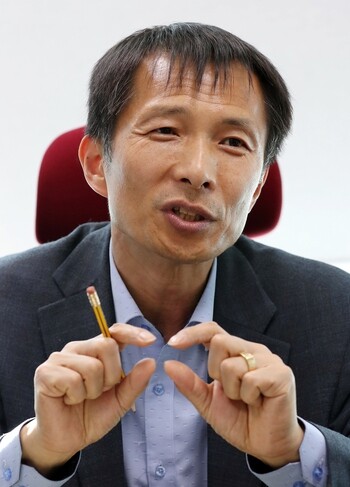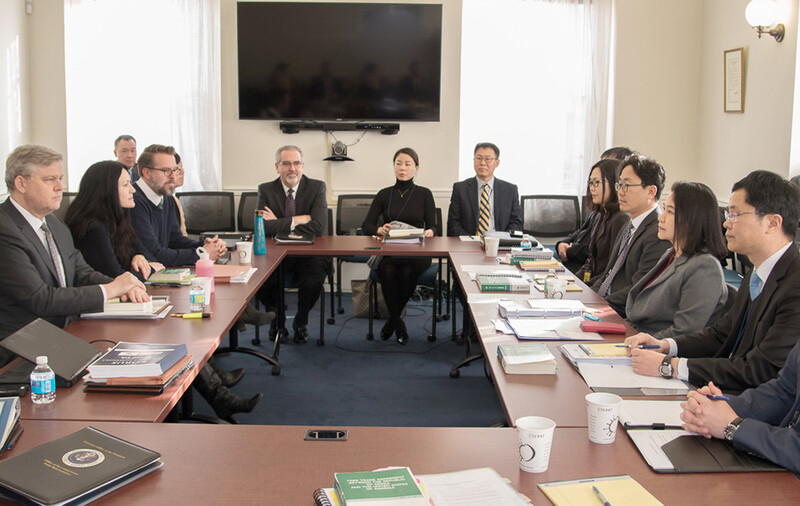hankyoreh
Links to other country sites 다른 나라 사이트 링크
[Interview] Whose interests are being served in KORUS FTA negotiations?

“We need to figure who are what the ‘national interests’ in the South Korea-US Free Trade Agreement amendment negotiations are supposed to serve. In particular, we need to set the trade order with the US straight with actions [in response to the US’s washing machine safeguard push] by imposing retaliatory tariffs on US beef imports.”
From the moment the Hankyoreh reporter arrived at the Soorun Asia Law Office in Seoul’s Garak neighborhood on Feb. 6, senior attorney Song Gi-ho began repeating the same question: What exactly are the supposed “national interests” that trade officials mention so often in discussing the South Korea-US FTA?
“These national interests are the just the perspectives and concepts presented by government officials themselves,” said the 55-year-old Song, who head the international trade committee for the group MINBYUN-Lawyers for a Democratic Society.
“By viewing things in term of which businesses’ or industries’ export volumes have increased and assessing national interests in terms of the trade balance, they’ve basically invited [US President] Donald Trump to call for [the FTA’s] abolition or amendment,” he added.
Song’s conclusion is that by fixating solely on financial interests, South Korean trade authorities have placed themselves in the dilemma of a trade imbalance.

The key question is what the national interests consist of.
“The category of ‘national interests,’ which is used as a standard for assessing any FTA, needs to include not only economic figures like exports and imports or the balance of trade but also social value in terms of things like the environment and security, as well as influences that vary for the vulnerable population groups and segments such as agriculture,” Song argued.
Song has been described as a “level-headed commentator” on the FTA, raising issues about various unequal “toxic provisions” since the agreement was first signed.
“The reason you form a bilateral FTA when we have a multilateral trade system in the form of the World Trade Organization (WTA) is so that both countries can produce distinctive and special value,” he said. “To look solely at the balance of trade in terms of imports and exports is mercantilist approach to trade.”
Public health and environmental protection are important parts of the national interest
Song’s argument is that issues of public health and the environment also important parts of the national interest that need to be a key part of the agenda in the current amendment negotiations.
According to trade treaty law, information about the influences and effects of an agreement must be published for the public in an implementation assessment after the agreement has reached its fifth year. The South Korean government has yet to release such a report.
“We do need improvements to the investor-state dispute system (ISDS), but we also need the implementation assessment to specifically state the areas where those provisions have prevented South Korea’s central and local governments from properly exercising their policy sovereignty,” Song said.
Song also predicted that the US would not amend its anti-dumping measures, safeguards, or other import regulations even if Seoul temporarily decides to offer something to suit Trump’s tastes.
“Trump’s anti-free trade ideas about ‘relieving trade imbalances’ are without precedent in [modern] international trade history, and we’re going to answer them with our own retaliatory tariffs on imported US beef [which is subject to a current tariff rate of 25% according to the FTA],” he added.
“Retaliation against US beef would hold meaning as an answer to the US’s continue failure to withdraw anti-dumping tariffs on washing machines despite losing in a 2013 anti-dumping dispute with South Korea, but it’s also essential to strike an even balance in the current amendment negotiations.”
Song also said the issue of fine particle dust from China will “need to be made into a major health and human rights issue” during follow-up talks on the South Korea-China Free Trade Agreement, which are set to begin next month.
“We need to create a framework where we continue to assert our environmental values and health rights with China and ensure they are reflected,” he said.
By Cho Kye-wan, staff reporter
Please direct questions or comments to [english@hani.co.kr]

Editorial・opinion
![[Column] Park Geun-hye déjà vu in Yoon Suk-yeol [Column] Park Geun-hye déjà vu in Yoon Suk-yeol](https://flexible.img.hani.co.kr/flexible/normal/500/300/imgdb/original/2024/0424/651713945113788.jpg) [Column] Park Geun-hye déjà vu in Yoon Suk-yeol
[Column] Park Geun-hye déjà vu in Yoon Suk-yeol![[Editorial] New weight of N. Korea’s nuclear threats makes dialogue all the more urgent [Editorial] New weight of N. Korea’s nuclear threats makes dialogue all the more urgent](https://flexible.img.hani.co.kr/flexible/normal/500/300/imgdb/original/2024/0424/7317139454662664.jpg) [Editorial] New weight of N. Korea’s nuclear threats makes dialogue all the more urgent
[Editorial] New weight of N. Korea’s nuclear threats makes dialogue all the more urgent- [Guest essay] The real reason Korea’s new right wants to dub Rhee a founding father
- [Column] ‘Choson’: Is it time we start referring to N. Korea in its own terms?
- [Editorial] Japan’s rewriting of history with Korea has gone too far
- [Column] The president’s questionable capacity for dialogue
- [Column] Are chaebol firms just pizza pies for families to divvy up as they please?
- [Column] Has Korea, too, crossed the Rubicon on China?
- [Correspondent’s column] In Japan’s alliance with US, echoes of its past alliances with UK
- [Editorial] Does Yoon think the Korean public is wrong?
Most viewed articles
- 1‘We must say no’: Seoul defense chief on Korean, USFK involvement in hypothetical Taiwan crisis
- 2N. Korean delegation’s trip to Iran shows how Pyongyang is leveraging ties with Moscow
- 3Amnesty notes ‘erosion’ of freedom of expression in Korea in annual human rights report
- 4[Column] Park Geun-hye déjà vu in Yoon Suk-yeol
- 5‘Weddingflation’ breaks the bank for Korean couples-to-be
- 6[Reportage] On US campuses, student risk arrest as they call for divestment from Israel
- 7[Editorial] New weight of N. Korea’s nuclear threats makes dialogue all the more urgent
- 8Korea sees more deaths than births for 52nd consecutive month in February
- 9Will NewJeans end up collateral damage in internal feud at K-pop juggernaut Hybe?
- 10Why Korea shouldn’t welcome Japan’s newly beefed up defense cooperation with US